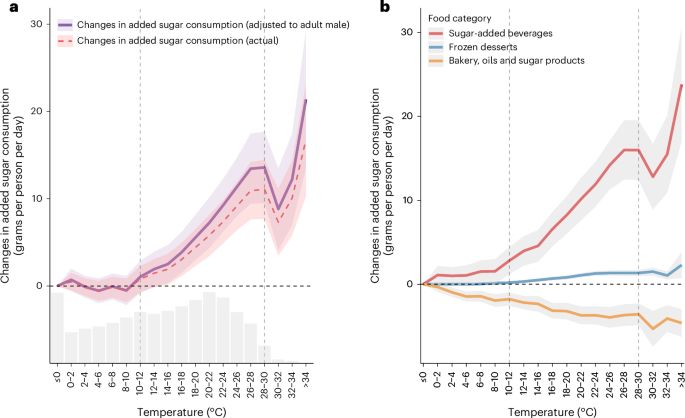Diet soda devotees have their reasons for obsessing over their favorite diet drink — sometimes it’s the flavor, and for others it’s the fact that it’s sugar-free. After all, you’re not getting a dose of high-fructose corn syrup hitting your blood sugar the way normal soda does.
But it’s still important to monitor how much you’re drinking. The rapper Fat Joe recently admitted to drinking between 30 to 40 cans of Diet Pepsi per day, and that got us wondering: How much soda is too much diet soda? To find out, we spoke with experts to learn what drinking too much diet soda can do to your body.
First, a look at the different types of artificial sweeteners in diet soda:
“Artificial sweeteners are made in a lab and plant-based ones come from natural sources,” said Vanessa Rissetto, a registered dietitian and CEO and co-founder of Culina Health. However, these are still processed. “They all vary in sweetness intensity, which is why only tiny amounts are used.”

Peter Dazeley via Getty Images
Diet soda will usually be made with one or a mix of the following sweeteners, according to Rissetto:
- Aspartame: This is approximately 200 times sweeter than sugar and breaks down into amino acids in the digestive system.
- Sucralose: Made from sugar, but your body doesn’t process it as sugar.
- Saccharin: It is one of the oldest artificial sweeteners and is used as a substitute for sugar.
- Acesulfame Potassium (Ace-K): This is often blended with other sweeteners to create a better taste.
- Stevia: A plant-based option that has minimal impact on blood sugar.
- Monk fruit: Another plant-based option that is often mixed with other sweeteners.
Are any sweeteners better for you than others? “They’re all considered safe in normal amounts,” Rissetto said. “But some people prefer plant-based ones like stevia or monk fruit because they feel ‘more natural’ and they may have less impact on the gut microbiome.” While taste and tolerance are personal, there’s not one that is necessarily considered the healthiest option.
In fact, Dr. Adam Perlman, chief medical officer at Pendulum Therapeutics, said none of these sweeteners are considered “healthy,” but they may be gentler on your body. “Certain artificial sweeteners, like sucralose or saccharin, have been linked to changes in gut bacteria that could influence how your body manages blood sugar.”
What Happens To Your Body On Diet Soda
“Even without sugar, several cans a day have been tied to higher risks for type 2 diabetes, heart disease and stroke,” Perlman said. “Over time, high intake may be linked to weight gain, heart problems and blood sugar issues.”
When it comes to type 2 diabetes, artificial sweeteners such as aspartame, sucralose and saccharin have the ability to alter the way the body responds to glucose. “They stimulate sweet taste receptors, priming the body to expect calories,” Rissetto explained. “Over time, this mismatch can diminish insulin sensitivity, making it harder for the body to regulate blood sugar.” In addition to this, your gut bacteria can be altered by these sweeteners. This can “impair glucose metabolism and increase inflammation, which are both risk factors for type 2 diabetes,” Rissetto said.
When your body experiences changes in gut bacteria and insulin resistance, you may have a spike in systemic inflammation, “which is a core mechanism in heart disease,” Rissetto said.
Heart disease can become a concern for those who drink too much diet soda because the hormonal and metabolic changes from artificial sweeteners can increase triglycerides and lower your “good” cholesterol, HDL, leading to endothelial dysfunction, which is when “chronic exposure to sweeteners and soda additives may damage blood vessel linings, raising blood pressure and atherosclerosis risk,” Rissetto said.
When your blood vessel health is compromised by frequent consumption of diet soda, there’s a chance you may be at a higher risk of small-vessel disease and impaired vascular function. Paired with the misconception that diet soda doesn’t cause much harm to the body because it doesn’t contain calories, “their biological effects can encourage weight gain, higher blood pressure and diabetes — all strong risk factors for stroke.”
What about the rumor that artificial sweeteners cause you to consume more food?
Artificial sweeteners are also known to lead people to consume more sugar or other foods throughout the day. While they don’t deliver calories, your brain’s food reward pathways may get a little confused after drinking a diet soda. “The body expects energy after tasting sweetness — when it doesn’t get it, hunger signals may increase, driving more eating,” Rissetto explained.
Your body also has a dopamine reward cycle, so when tasting something sweet, it triggers a dopamine release in the brain’s reward center. “Without actual energy intake, the ‘reward’ feels incomplete, pushing a person to snack more, especially on sugary or high-carb foods,” Rissetto added.
“Over time, high intake may be linked to weight gain, heart problems and blood sugar issues,” Perlman said. “Some sweeteners can also change the makeup of your gut bacteria, which might affect metabolism and inflammation.”
Even without sugar, diet soda is acidic, so it’s possible that it can erode teeth. In addition to this, you have to consider how caffeine can affect your daily life. “Caffeine can cause jitters, headaches or sleep problems,” Rissetto said. “Some people get bloating or stomach discomfort from the carbonation or the sweeteners themselves. In certain people, it can increase cravings for sweet foods.”
So How Much Diet Soda Is Too Much?
Most experts say stick to one a day or a few a week and make water or unsweetened drinks your go-to.
On the same page, Rissetto said, “I’d say treat it as an occasional drink, not your main source of hydration. One a day is fine for most people, but a few a week is even better. Mix it up with water, sparkling water or unsweetened drinks so you’re not relying on it.”


